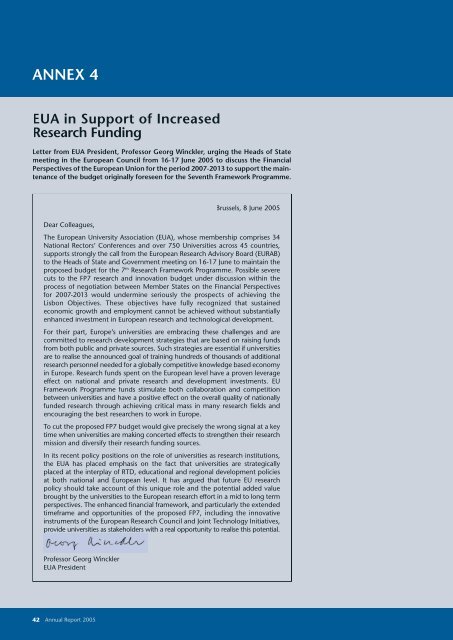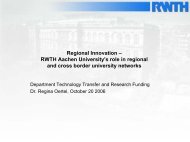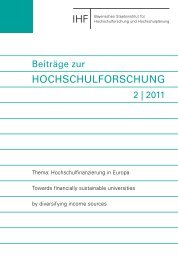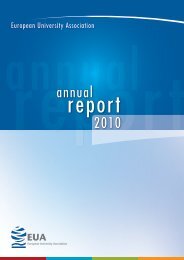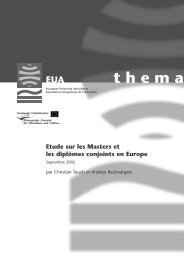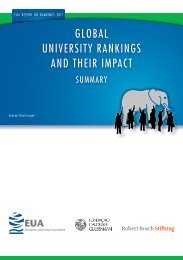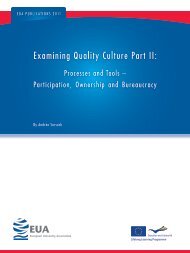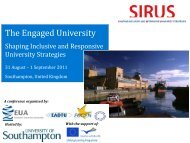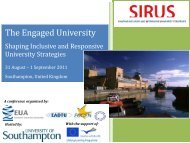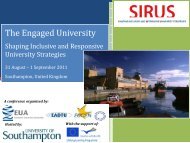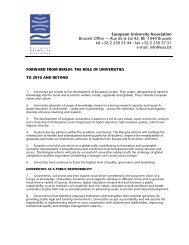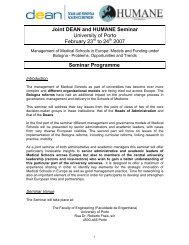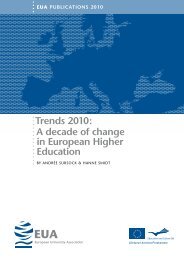English - European University Association
English - European University Association
English - European University Association
You also want an ePaper? Increase the reach of your titles
YUMPU automatically turns print PDFs into web optimized ePapers that Google loves.
ANNEX 4<br />
EUA in Support of Increased<br />
Research Funding<br />
Letter from EUA President, Professor Georg Winckler, urging the Heads of State<br />
meeting in the <strong>European</strong> Council from 16-17 June 2005 to discuss the Financial<br />
Perspectives of the <strong>European</strong> Union for the period 2007-2013 to support the maintenance<br />
of the budget originally foreseen for the Seventh Framework Programme.<br />
Dear Colleagues,<br />
42 Annual Report 2005<br />
Brussels, 8 June 2005<br />
The <strong>European</strong> <strong>University</strong> <strong>Association</strong> (EUA), whose membership comprises 34<br />
National Rectors’ Conferences and over 750 Universities across 45 countries,<br />
supports strongly the call from the <strong>European</strong> Research Advisory Board (EURAB)<br />
to the Heads of State and Government meeting on 16-17 June to maintain the<br />
proposed budget for the 7 th Research Framework Programme. Possible severe<br />
cuts to the FP7 research and innovation budget under discussion within the<br />
process of negotiation between Member States on the Financial Perspectives<br />
for 2007-2013 would undermine seriously the prospects of achieving the<br />
Lisbon Objectives. These objectives have fully recognized that sustained<br />
economic growth and employment cannot be achieved without substantially<br />
enhanced investment in <strong>European</strong> research and technological development.<br />
For their part, Europe’s universities are embracing these challenges and are<br />
committed to research development strategies that are based on raising funds<br />
from both public and private sources. Such strategies are essential if universities<br />
are to realise the announced goal of training hundreds of thousands of additional<br />
research personnel needed for a globally competitive knowledge based economy<br />
in Europe. Research funds spent on the <strong>European</strong> level have a proven leverage<br />
effect on national and private research and development investments. EU<br />
Framework Programme funds stimulate both collaboration and competition<br />
between universities and have a positive effect on the overall quality of nationally<br />
funded research through achieving critical mass in many research fi elds and<br />
encouraging the best researchers to work in Europe.<br />
To cut the proposed FP7 budget would give precisely the wrong signal at a key<br />
time when universities are making concerted effects to strengthen their research<br />
mission and diversify their research funding sources.<br />
In its recent policy positions on the role of universities as research institutions,<br />
the EUA has placed emphasis on the fact that universities are strategically<br />
placed at the interplay of RTD, educational and regional development policies<br />
at both national and <strong>European</strong> level. It has argued that future EU research<br />
policy should take account of this unique role and the potential added value<br />
brought by the universities to the <strong>European</strong> research effort in a mid to long term<br />
perspectives. The enhanced fi nancial framework, and particularly the extended<br />
timeframe and opportunities of the proposed FP7, including the innovative<br />
instruments of the <strong>European</strong> Research Council and Joint Technology Initiatives,<br />
provide universities as stakeholders with a real opportunity to realise this potential.<br />
Professor Georg Winckler<br />
EUA President


